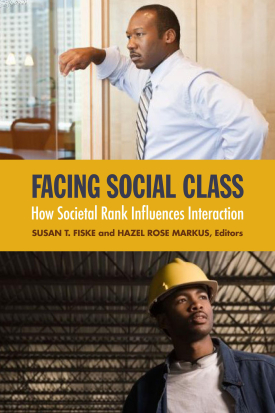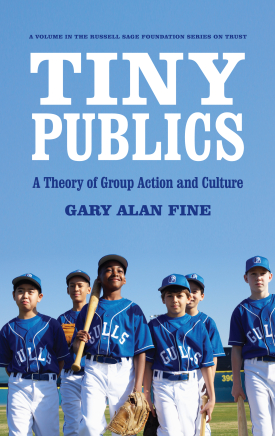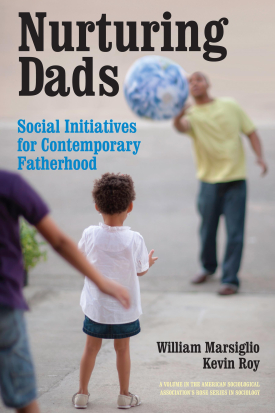
Facing Social Class
About This Book
Many Americans, holding fast to the American Dream and the promise of equal opportunity, claim that social class doesn't matter. Yet the ways we talk and dress, our interactions with authority figures, the degree of trust we place in strangers, our religious beliefs, our achievements, our senses of morality and of ourselves—all are marked by social class, a powerful factor affecting every domain of life. In Facing Social Class, social psychologists Susan Fiske and Hazel Rose Markus, and a team of sociologists, anthropologists, linguists, and legal scholars, examine the many ways we communicate our class position to others and how social class shapes our daily, face-to-face interactions—from casual exchanges to interactions at school, work, and home.
Facing Social Class exposes the contradiction between the American ideal of equal opportunity and the harsh reality of growing inequality, and it shows how this tension is reflected in cultural ideas and values, institutional practices, everyday social interactions, and psychological tendencies. Contributor Joan Williams examines cultural differences between middle- and working-class people and shows how the cultural gap between social class groups can influence everything from voting practices and political beliefs to work habits, home life, and social behaviors. In a similar vein, Annette Lareau and Jessica McCrory Calarco analyze the cultural advantages or disadvantages exhibited by different classes in institutional settings, such as those between parents and teachers. They find that middle-class parents are better able to advocate effectively for their children in school than are working-class parents, who are less likely to challenge a teacher's authority.
Michael Kraus, Michelle Rheinschmidt, and Paul Piff explore the subtle ways we signal class status in social situations. Conversational style and how close one person stands to another, for example, can influence the balance of power in a business interaction. Diana Sanchez and Julie Garcia even demonstrate that markers of low socioeconomic status such as incarceration or unemployment can influence whether individuals are categorized as white or black—a finding that underscores how race and class may work in tandem to shape advantage or disadvantage in social interactions.
The United States has one of the highest levels of income inequality and one of the lowest levels of social mobility among industrialized nations, yet many Americans continue to buy into the myth that theirs is a classless society. Facing Social Class faces the reality of how social class operates in our daily lives, why it is so pervasive, and what can be done to alleviate its effects.
SUSAN T. FISKE is Eugene Higgins Professor of Psychology at Princeton University.
HAZEL ROSE MARKUS is Davis-Brack Professor in the Behavioral Sciences in the Department of Psychology, director of the Center for Comparative Studies in Race and Ethnicity (CCSRE), and director of the Mind, Culture, and Society Lab at Stanford University.
CONTRIBUTORS: Courtney Bearns, Jessica McCrory Colarco, Paul DiMaggio, Susan R. Fisk, Stephanie A. Fryberg, Julie A. Garcia, Crystal C. Hall, Michael W. Kraus, Adrie Kusserow, Annette Lareau, Peggy J. Miller, Miguel Moya, Paul K. Piff, Michelle L. Rheinschmidt, Cecilia L. Ridgeway, Ann Marie Russell, Diana T. Sanchez, Douglas E. Sperry, Nicole M. Stephens, Joan C. Williams.
Related Events & Media
RSF Journal
View Book Series
Sign Up For Our Mailing List
Apply For Funding

Tiny Publics
About This Book
If all politics is local, then so is almost everything else, argues sociologist Gary Alan Fine. We organize our lives by relying on those closest to us—family members, friends, work colleagues, team mates, and other intimates—to create meaning and order. In this thoughtful and wide-ranging book, Fine argues that the basic building blocks of society itself are forged within the boundaries of such small groups, the "tiny publics" necessary for a robust, functioning social order at all levels. Action, meaning, authority, inequality, organization, and institutions all have their roots in small groups. Yet for the past twenty-five years social scientists have tended to ignore the power of groups in favor of an emphasis on organizations, societies, or individuals. Based on over thirty-five years of Fine's own ethnographic research across an array of small groups, Tiny Publics presents a compelling new theory of the pivotal role of small groups in organizing social life.
No social system can thrive without flourishing small groups. They provide havens in an impersonal world, where faceless organizations become humanized. Taking examples from such diverse worlds as Little League baseball teams, restaurant workers, high school debate teams, weather forecasters, and political volunteers, Fine demonstrates how each group has its own unique culture, or idioculture—the system of knowledge, beliefs, behavior, and customs that define and hold a group together. With their dense network of relationships, groups serve as important sources of social and cultural capital for their members. The apparently innocuous jokes, rituals, and nicknames prevalent within Little League baseball teams help establish how teams function internally and how they compete with other teams. Small groups also provide a platform for their members to engage in broader social discourse and a supportive environment to begin effecting change in larger institutions. In his studies of mushroom collectors and high school debate teams, Fine demonstrates the importance of stories that group members tell each other about their successes and frustrations in fostering a strong sense of social cohesion. And Fine shows how the personal commitment political volunteers bring to their efforts is reinforced by the close-knit nature of their work, which in turn has the power to change larger groups and institutions. In this way, the actions and debates begun in small groups can eventually radiate outward to affect every level of society.
Fine convincingly demonstrates how small groups provide fertile ground for the seeds of civic engagement. Outcomes often attributed to large-scale social forces originate within such small-scale domains. Employing rich insights from both sociology and social psychology, as well as vivid examples from a revealing array of real-work groups, Tiny Publics provides a compelling examination of the importance of small groups and of the rich vitality they bring to social life.
GARY ALAN FINE is professor of sociology at Northwestern University.
A Volume in the Russell Sage Foundation Series on Trust
RSF Journal
View Book Series
Sign Up For Our Mailing List
Apply For Funding

Nurturing Dads
About This Book
A Volume in the American Sociological Association’s Rose Series in Sociology
American fathers are a highly diverse group, but the breadwinning, live-in, biological dad prevails as the fatherhood ideal. Consequently, policymakers continue to emphasize marriage and residency over initiatives that might help foster healthy father-child relationships and creative co-parenting regardless of marital or residential status. In Nurturing Dads, William Marsiglio and Kevin Roy explore the ways new initiatives can address the social, cultural, and economic challenges men face in contemporary families and foster more meaningful engagement between many different kinds of fathers and their children.
What makes a good father? The firsthand accounts in Nurturing Dads show that the answer to this question varies widely and in ways that counter the mainstream "provide and reside" model of fatherhood. Marsiglio and Roy document the personal experiences of more than three hundred men from a wide range of socioeconomic backgrounds and diverse settings, including fathers-to-be, young adult fathers, middle-class dads, stepfathers, men with multiple children in separate families, and fathers in correctional facilities. They find that most dads express the desire to have strong, close relationships with their children and to develop the nurturing skills to maintain these bonds. But they also find that disadvantaged fathers, including young dads and those in constrained financial and personal circumstances, confront myriad structural obstacles, such as poverty, inadequate education, and poor job opportunities.
Nurturing Dads asserts that society should help fathers become more committed and attentive caregivers and that federal and state agencies, work sites, grassroots advocacy groups, and the media all have roles to play. Recent efforts to introduce state-initiated paternity leave should be coupled with social programs that encourage fathers to develop unconditional commitments to children, to co-parent with mothers, to establish partnerships with their children's other caregivers, and to develop parenting skills and resources before becoming fathers via activities like volunteering and mentoring kids. Ultimately, Marsiglio and Roy argue, such combined strategies would not only change the policy landscape to promote engaged fathering but also change the cultural landscape to view nurturance as a fundamental aspect of good fathering.
Care is a human experience—not just a woman's responsibility—and this core idea behind Nurturing Dads holds important implications for how society supports its families and defines manhood. The book promotes the progressive notion that fathers should provide more than financial support and, in the process, bring about a better start in life for their children.
WILLIAM MARSIGLIO is professor in the Department of Sociology and Criminology & Law at the University of Florida.
KEVIN ROY is associate professor of family science at the University of Maryland
Related Events & Media
RSF Journal
View Book Series
Sign Up For Our Mailing List
Apply For Funding
Pagination
- Previous page
- Page 28
- Next page
